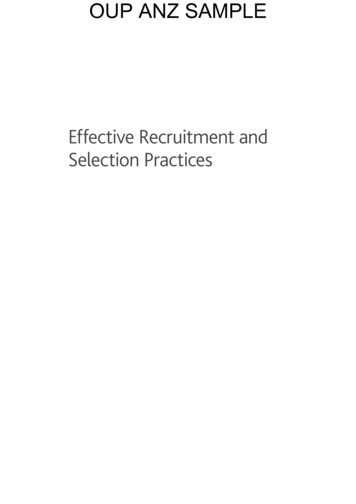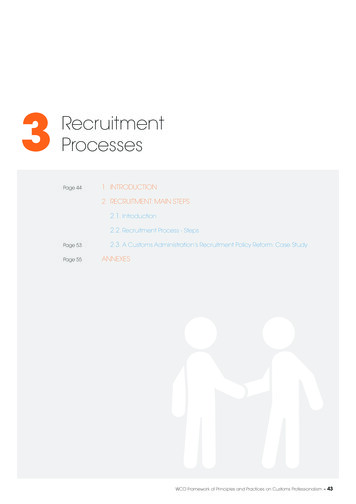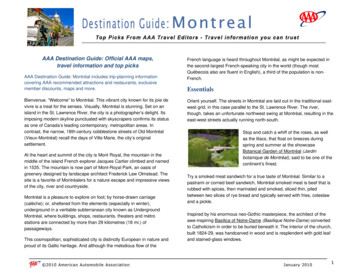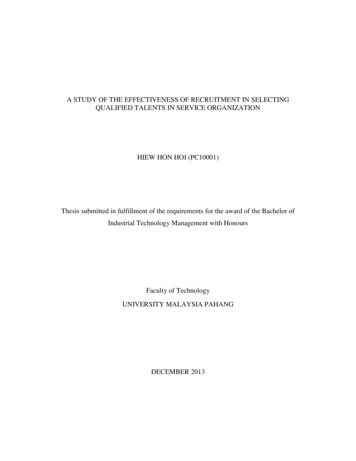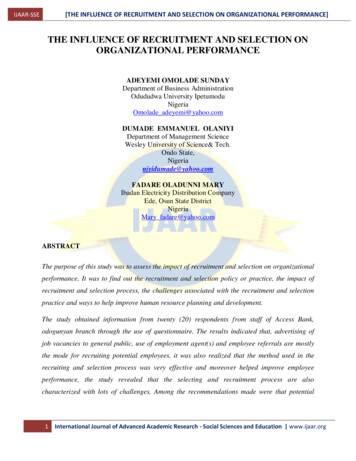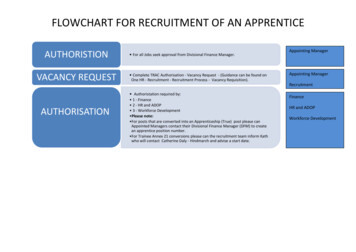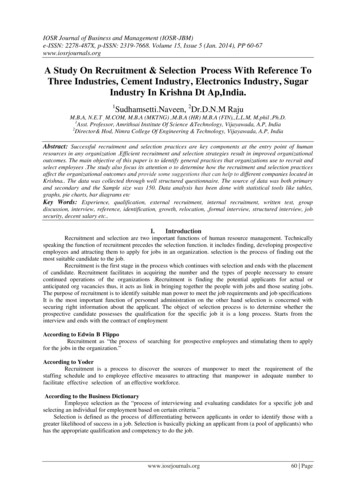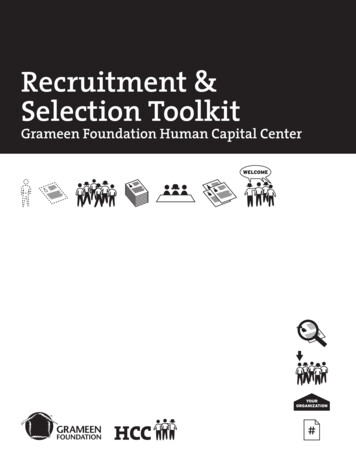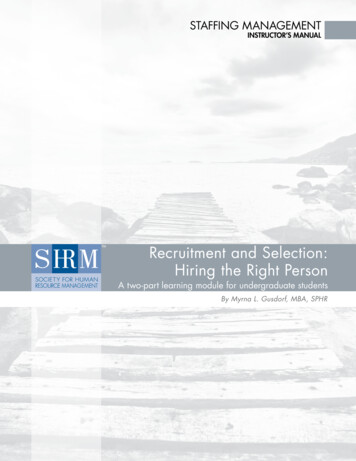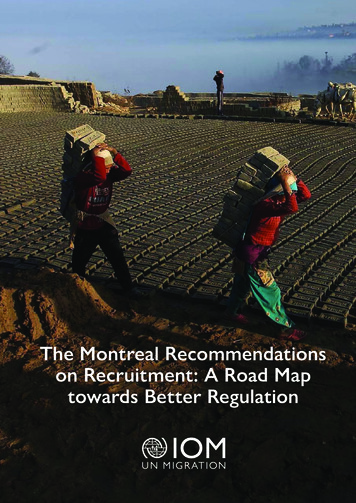
Transcription
The Montreal Recommendationson Recruitment: A Road Maptowards Better Regulation
The opinions expressed in the report are those of the authors and do not necessarilyreflect the views of the International Organization for Migration (IOM). The designationsemployed and the presentation of material throughout the report do not imply expressionof any opinion whatsoever on the part of IOM concerning legal status of any country,territory, city or area, or of its authorities, or concerning its frontiers or boundaries.IOM is committed to the principle that humane and orderly migration benefits migrantsand society. As an intergovernmental organization, IOM acts with its partners in theinternational community to: assist in the meeting of operational challenges of migration;advance understanding of migration issues; encourage social and economic developmentthrough migration; and uphold the human dignity and well-being of migrants.This publication was made possible through support provided by Immigration, Refugees andCitizenship Canada, the Swiss Agency for Development and Cooperation, the Departmentof State’s Bureau of Population, Refugees and Migration of the United States and theministère des Relations internationales et de la Francophonie under the framework ofthe IOM Global Conference on the Regulation of International Recruitment. However,the views expressed do not necessarily reflect the official policies of the Government ofCanada, Government of Switzerland, Government of the United States and Gouvernementdu Québec.IOM gratefully acknowledges the support of its donors in the production of this publicationand Katharine Jones, its lead author.Publisher:International Organization for Migration17 route des MorillonsP.O. Box 171211 Geneva 19SwitzerlandTel.: 41 22 717 9111Fax: 41 22 798 6150Email: hq@iom.intWebsite: www.iom.intCover photo: IOM 2013/Laxmi PRASAD NGAKHUSI 2020 International Organization for Migration (IOM)All rights reserved. No part of this publication may be reproduced, stored in a retrievalsystem, or transmitted in any form or by any means, electronic, mechanical, photocopying,recording, or otherwise without the prior written permission of the publisher.PUB2020/009/EL
The Montreal Recommendationson Recruitment: A Road Maptowards Better RegulationSwiss Agency for Developmentand Cooperation SDC
IOM 2007/Jemini PANDYA
ContentsIntroduction.11. Protecting migrant workers through recruitment regulation.32. Recruitment fees.53. Registration and licensing.74. Administration, inspections and enforcement.95. Ratings, rewards and rankings: Incentivizing legal compliance.136. Access to grievance mechanisms and dispute resolution.157. Bilateral, regional and multilateral mechanisms.178. Migrant welfare and assistance.199. Maintaining the momentum on regulation.21Relevant resources.23The Montreal Recommendations on Recruitment:A Road Map towards Better Regulationiii
IOM 2007/Rocio SANZ
IntroductionRegulators have a responsibility to establish and effectively enforce the legal and policyframework under which labour recruiters and employers operate and guarantee theircompliance. With the aim of improving the inter-jurisdictional regulation of internationallabour recruitment, 100 regulators from more than 30 countries gathered at the GlobalConference on the Regulation of International Recruitment, in Montreal, Canada, in June2019. The International Organization for Migration (IOM) co-hosted this conference inpartnership with the Government of Canada and the Gouvernement du Québec, theSwiss Agency for Development and Cooperation and the Department of State’s Bureauof Population, Refugees, and Migration of the United States. The event brought togethersenior policymakers, leading experts and practitioners from ministries of Labour,Foreign Affairs and Immigration, supported by experts from international and regionalorganizations, including IOM, International Labour Organization (ILO) and Organizationfor Security and Cooperation in Europe (OSCE). Through two days of presentations,round-table discussions and break-out sessions, participants articulated recommendationsto improve the regulation of international recruitment in nine principal areas:(1)(2)(3)(4)(5)(6)(7)(8)(9)Protecting migrant workers;Recruitment fees;Registration and licensing;Administration, inspections and enforcement;Ratings, rewards and rankings;Access to grievance mechanisms and dispute resolution;Bilateral, regional and multilateral mechanisms;Migrant welfare and assistance; andMaintaining the momentum on regulation.The 55 recommendations, reproduced below with accompanying commentary, areconsistent with international human rights and labour standards, the ILO GeneralPrinciples and Operational Guidelines for Fair Recruitment1 and the multi-stakeholderstandard established by the International Recruitment Integrity System (IRIS).2 Theyprovide diverse, practical guidance to governments to enable more effective regulationof international recruitment and protection of migrant workers.1See http://ilo.org/global/topics/fair-recruitment/WCMS 536755/lang--en/index.htm.2For more information about the IRIS Standard, see https://iris.iom.int/iris-standard.The Montreal Recommendations on Recruitment:A Road Map towards Better Regulation1
THE MONTREAL RECOMMENDATIONSON RECRUITMENT: A ROAD MAPTOWARDS BETTER REGULATION21. PROTECTING MIGRANT2. RECRUITMENT FEESWORKERS THROUGHRECRUITMENT REGULATION3. REGISTRATION ANDLICENSING4. ADMINISTRATION,INSPECTIONS ANDENFORCEMENT5. RATINGS, REWARDS ANDRANKINGS: INCENTIVIZINGLEGAL COMPLIANCE6. ACCESS TO GRIEVANCEMECHANISMS ANDDISPUTE RESOLUTION7. BILATERAL, REGIONALAND MULTILATERALMECHANISMS8. MIGRANT WELFAREAND ASSISTANCE9. MAINTAINING THEMOMENTUM ONREGULATIONIntroduction
1. Protecting migrant workers throughrecruitment regulationGovernments bear the responsibility to protect the rights of all persons within theirjurisdiction, including migrant workers, and ensure that recruitment for employment intheir jurisdiction takes place in a way that respects, protects and fulfils internationallyrecognized human rights. In addition to protecting migrant workers, governments shouldseek to regulate employment and recruitment in a manner that is clear, transparentand effectively enforced. One goal of recruitment regulation should be to enhancetransparency in international recruitment to make it easier for regulatory authoritiesto monitor and enforce compliance, and for workers to seek effective remedy againstoffenders. A further goal of recruitment regulation should be to “level the playing field” toensure that recruiters and employers comply with the same international standards andthat exploitative recruiters are not able to profit from undercutting compliant agencies.Increased collaboration between national inspectorates of origin and destination Statescan support the development and implementation of effective recruitment regulation.Recommendations1. Governments at relevant levels should adopt or, where necessary, strengthenlaws and regulations to promote fair and ethical recruitment in compliance withinternational standards. Relevant laws and regulations should encompass allstages of the recruitment process, apply to all actors performing recruitmentfunctions and apply to all workers, including those in an irregular migrationsituation. Governments should review and update current laws and regulationsto also cover online recruitment.2. Enforcement of recruitment regulation should not be used as the reasonto take action against undocumented migrant workers. The principal aim ofrecruitment regulation should be to protect all migrant workers, regardless oftheir legal status.The Montreal Recommendations on Recruitment:A Road Map towards Better Regulation3
IOM 2007/Angelo JACINTO41. Protecting migrant workers through recruitment regulation
2. Recruitment feesInternational migrants are often charged fees and related costs for their recruitment,visas and work permits. Other charges may include medical tests and vaccinations, predeparture orientation and training, transportation, accommodation and administrativeor document processing. Migrants may be charged by the employer or by travel agents,medical centres, training centres, accommodation providers and, in some cases, bycorrupt officials demanding “kick-backs” or bribes. Some of the money goes towardsfixed migration costs, such as for travel, processing visas and applying for a passport.However, even legitimate costs are often inflated with additional “service fee” chargeslevied by recruiters. If employers fail to pay any or all these costs, recruiters transfer themto migrants. In some cases, origin-country recruiters bribe employer human resourcedepartments to win their business. These “costs” are then included in the recruitmentfees charged to migrants, inflating the cost even more. Migrants may pay the total feeprior to their departure, often relying on informal and formal loans. In other cases, theymay be charged deductions from their salary or are required to make payments fromemployment earnings once in the destination country. The ILO definition of recruitmentfees and related costs, which accompanies the General Principles and OperationalGuidelines for Fair Recruitment, provides an internationally agreed definition and clearlystates that such fees and costs should not be charged to workers.Approaches to regulating fees and related costs vary significantly across the world. Manycountries of destination have adopted legislation to prohibit the charging of recruitmentfees to workers. Others allow recruitment fees to be charged up to a “fee ceiling” (such asone month’s salary or 10% of a monthly salary) aimed at preventing the worst extremesof debt bondage. In still other cases, States prohibit worker fees in specific sectors thatare regarded as high risk but not in others. Nevertheless, even in States where workerfees are prohibited, there is often no corresponding legislation that requires employersto pay the full cost of recruitment. This is an important distinction and gap. In contrast,many multinational companies have publicly committed to the Employer Pays Principle inorder to root out recruitment fees charged to workers in their supply chains.3 Finally, toaddress inconsistencies in relevant jurisdictions, some countries of origin and destination– when negotiating bilateral agreements – have agreed to limit, reduce or prohibit feecharging to migrant workers.3For more information about the Employer Pays Principle, see nciple.The Montreal Recommendations on Recruitment:A Road Map towards Better Regulation5
Prospective employers, public or private, or their intermediaries, and notthe workers, should bear the cost of recruitment. The full extent and natureof costs, for instance costs paid by employers to labour recruiters, shouldbe transparent to those who pay them.– ILO General Principles and Operational Guidelines for Fair RecruitmentRecommendations3. Governments should take measures to eliminate the charging of recruitmentfees and related costs to workers and jobseekers, using the ILO definition asa guide.4. Employers should be supported by regulatory authorities with clear guidancerelated to “charge rates”, which indicates the likely range of fees that theymight reasonably be charged by labour recruiters who comply with all relevantnational laws and policies. Where employers are offered or pay lower amounts,this would be a potential indication that fees have been charged to workers.5. Employers should be required to pay salaries through a bank accountsupplemented with a written or electronic payslip to facilitate transparencyand monitoring. In performing due diligence, employers should be encouragedto ensure that the bank accounts used by workers are their own and that theyhave full, unhindered access to them (such as proof of holding the relevant bankcard).6. Employers should be required to conduct due diligence on their supply chainsto ensure that no recruitment fees have been charged to workers. Employersshould be required to establish financial compensation schemes to refund anyrecruitment fees charged to workers where these are found.62. Recruitment fees
3. Registration and licensingRegistration and licensing act as a shorthand for States to grant legal status to andformalize businesses. Companies that operate without required documentationare considered to be operating illegally. Effective licensing and registration schemesenhance enforcement as regulators and users can distinguish legal from illegal actors.However, existing schemes vary enormously. This includes the standards to whichrecruiters must comply, as well as the extent and frequency of inspections. In manycountries, significant numbers of informal recruiters operate outside or on the marginsof the licensing framework. This places significant limitations on the scheme’s overalleffectiveness and represents a substantial challenge for regulators. At the same time,international recruitment involves multiple actors across more than one legal jurisdiction.This makes establishing accountability and legal liability for recruitment-related abuses achallenge. Global principles and guidance on how recruitment should be practised arenow firmly established by the ILO General Principles and Operational Guidelines for FairRecruitment and the IRIS Standard. These can be transposed into national law and policythrough licensing and registration schemes, while greater transparency and accountabilitycan be introduced through joint liability. Transparency and disclosure requirements canalso be powerful items in a regulator’s toolbox.Recommendations7. Regulators are encouraged to implement and improve effectiveness of licensingand registration of labour recruiters to increase transparency and legalaccountability across jurisdictions and within supply chains.8. All actors that engage in recruitment, whether individuals or enterprises, shouldbe registered either through licensing or a registration scheme. Such schemesshould be supported by an inspections and sanctions regime to address noncompliance (see below).9. Governments should require recruiters to comply with a globally recognizedethical code of conduct for recruitment consistent with establishedinternational guidance, such as the IRIS Standard and ILO General Principlesand Operational Guidelines for Fair Recruitment. The Code of Conduct of theWorld Employment Confederation is an example of a standard adopted by aglobal industry association.44See on-global/code-of-conduct-2/.The Montreal Recommendations on Recruitment:A Road Map towards Better Regulation7
10. Governments should publish the names and contact details of all licensed andregistered recruiters and this should be kept regularly updated. Authoritiesshould also publish the details of recruiters who are under investigation fornon-compliance and whose licence or registration has been suspended orrevoked, and the reasons for this. Sub-agents should have their names andcontact details publicly available in local-level government offices or otherrelevant institutions, including Migrant Resource Centres (MRCs).11. Governments should implement schemes to enhance transparency anddisclosure, for example by requiring the following: (a) employers to disclose thenames of the labour recruiters they contract; and (b) recruiters to disclose thenames of their business partners. Disclosure of this kind could be establishedas a pre-condition or requirement for accessing migrant worker programmes.12. Governments should require licence and registration holders to annually reportthe steps they are taking to combat exploitation, including addressing risks oftrafficking in persons and forced labour. This would ensure that recruitmentregulation is consistent with and reinforces new modern slavery legislation thattargets large companies.13. Governments should improve how applicants for licensing or registration arescreened. This can include conducting criminal checks through internationalbodies such as INTERPOL and/or requiring applicants and licencees to providebackground and criminal checks from their jurisdictions of residence andoperation. Governments may also consider requiring applicants to submit acertificate of “good character” as part of the screening process.14. Governments should consider the effectiveness of requiring licence holders todeposit a financial security or bond as a commitment to good behaviour, withbonds being used in case of any compensation awarded against them in civilclaims.83. Registration and licensing
4. Administration, inspectionsand enforcementHow the regulation of recruitment is monitored and enforced has a direct impact onits effectiveness. In many jurisdictions, a licence or registration is not a guarantee thatthe recruiter is fully compliant with relevant laws and policies. Prosecutors and judgesoften lack training and understanding of the issues, which means that the range ofavailable sanctions are rarely applied even where prosecutions are brought. At the sametime, the deterrence value of sanctions is low, as cases often do not reach court andeven where they do, prison sentences are rarely imposed on recruiters who offend.Effective monitoring requires substantial resources, as well as a mandate that allows forinvestigation of offences. There is an urgent need to develop cross-jurisdictional dialogueto open the potential for bilateral investigations of international recruitment practices.Intelligence gathered during monitoring and enforcement is valuable in conducting rootcause analyses that policymakers can use to identify gaps in policy that need to beexamined and addressed.Governments should effectively enforce relevant laws and regulations,and require all relevant actors in the recruitment process to operate inaccordance with the law.– ILO General Principles and Operational Guidelines for Fair RecruitmentRecommendations15. Governments should improve inspections of labour recruiters, supported bythe commissioning of a global review of best inspection practices to betterunderstand how these could be conducted. Potential models of inspection couldinclude risk-based and intelligence-led inspections, a supply chain approach thatincludes inspections of employers and companies that hire/supervise recruitedmigrant workers, and unannounced, on-site inspections.16. Governments should strengthen and adequately resource labour inspectoratesand other relevant inspection authorities and ensure that they are effective ininvestigating all stages of the recruitment process.17. Governments should provide a means for migrant workers to safely andmeaningfully participate in all stages of the inspection and enforcement process,including – where necessary – the extension of migrant residency and workpermits to enable them to participate in relevant court proceedings againstalleged perpetrators.The Montreal Recommendations on Recruitment:A Road Map towards Better Regulation9
18. Governments should consider the development, adoption and implementationof programmes to hold employers and recruiters to account, either individuallyor jointly, such as joint liability schemes.19. Governments should establish an anonymous, multilingual national (orsubnational if more appropriate) reporting “hotline” to identify non-complianceof recruiters, as well as identify illegal recruiters.20. Governments should facilitate the introduction of information-sharing protocolsbetween relevant departments and levels of government to maximize thepotential for increasing intelligence about the international recruitment industry.21. Governments should consider the effectiveness of the current range of criminal,civil and administrative penalties available to inspectorates, prosecutors andjudges and consider whether additional penalties should be introduced.Appropriate penalties could include the following: (a) revoking the licences ofnon-compliant agencies and banning their directors from operating a businessfor a set period of time; (b) increasing the size of the financial security orbond required for each breach of compliance; (c) a system of administrativepenalties or fines for illegally charged recruitment fees, with amounts imposedproportionate to amount of fee charged; (d) forcing the closure of noncompliant recruiters; and (e) financial restitution for victims.22. Governments should develop and disseminate educational materials, as well asonline and in-person training that raises employer awareness about risks andconsequences related to unethical recruitment.23. Governments should also introduce a range of penalties (commensurate tothe harm caused to the migrant worker) aimed at employers who subcontractnon-compliant or illegal recruiters.24. Governments should establish a firewall between immigration authoritiesand regulatory bodies responsible for recruitment to encourage reportingwhile protecting migrant workers. Where migrant workers’ employmentauthorization is contingent on continued employment, but that employmentis disrupted or discontinued as a result of an inspection or determination ofnon-compliance, governments should provide impacted migrant workers eitherwith lawful status to remain (such as to participate as witnesses in investigationsand/or prosecutions) or a means to transfer lawfully to another employer.Enforcement of recruitment regulation should not be used as action againstundocumented migrant workers. The principal aim of recruitment regulationshould be to protect all migrant workers, regardless of legal status.104. Administration, inspections and enforcement
25. Regulatory authorities in origin and destination States should developmechanisms that would allow for conducting joint investigations into labourrecruiters, considering which authority has the strongest intelligence andconsequently the best chance of success prosecuting the offender.26. Governments of origin countries should properly resource the deployment oflabour attachés to destination States. Labour attachés can effectively scrutinizethe end-to-end process of recruitment and can screen out unlicensed or noncompliant recruiters. They are also ideally placed as a coordinating link betweenthe monitoring and enforcement bodies in the destination State and the homeauthorities.27. Governments are encouraged to reinforce enforcement efforts by implementingcomprehensive and ongoing programmes to raise public awareness about therisks of unethical recruitment and irregular migration.The Montreal Recommendations on Recruitment:A Road Map towards Better Regulation11
IOM 2009121. Protecting migrant workers through recruitment regulation
5. Ratings, rewards and rankings:Incentivizing legal complianceIncentivizing compliance can be a relatively low-cost but effective way of achieving change.Such approaches are in their infancy but are now starting to be viewed as a positiveway to shift existing market norms towards ethical recruitment. Incentives may targetemployers or recruiters. Rankings of recruiters, where these are developed, should bebased on the international principles of ethical recruitment reflected in the IRIS Standard.It is important that indicators of recruitment quality (that is, how good the standardof recruitment is) are used to evaluate recruiters rather than those of quantity (thatis, how many people are recruited). Publishing such rankings is expected to improverecruiter compliance because reputable employers will seek out the highest rankedrecruiter, bringing new opportunities for business and growth. High-ranking recruitersmay also benefit in jurisdictions where they are offered a “fast-track” process for visaor work permit applications. Facilitating quicker recruitment can provide them with acompetitive advantage, which others may strive for, thus encouraging a “race to the top”.At the same time, government procurement of goods and services involves extensivesupply chains, often directly or indirectly linked to recruitment services. In such cases,governments may consider integrating a requirement to demonstrate a commitment toethical recruitment in public tenders.Recommendations28. Governments should consider, develop and implement meaningful, globallyrecognized and evidence-based ratings, rankings and reward schemes for labourrecruiters targeted at incentivizing compliance with applicable national laws andpolicies and ethical recruitment standards.29. Governments should consider introducing a ranking system that includesrewards such as the following: (a) fast-tracked visa or work permit applicationsfor licence-holding recruiters that demonstrate regular compliance; (b) reducedreporting requirements; or (c) access to cheap credit and/or business loans.30. Governments should conduct, commission or consult existing research intowhat works in incentivizing compliance, including consulting with recruiters,employers and workers.31. Governments should establish a rewards commission comprising representativesfrom government, the recruitment industry, employers’ associations, tradeunions and civil society that can monitor the impact of the scheme and sharelearning.The Montreal Recommendations on Recruitment:A Road Map towards Better Regulation13
32. Governments should introduce ethical recruitment standards as a condition ofentry into public procurement processes.33. Governments should consider supporting and/or establishing electronicplatforms that will allow workers and their organizations, civil societyorganizations (CSOs) and employers to independently review recruiters andperiodically assess them.5514Two examples of electronic platforms include the following: (a) Recruitment Advisor(https://recruitmentadvisor.org/), developed by a consortium of trade unions; and (b) e), an initiative led by the US-based non-profit, Centro de losDerechos del Migrante.5. Ratings, rewards and rankings: Incentivizing legal compliance
6. Access to grievance mechanismsand dispute resolutionState-supported remedy can take many forms, including formal apology, restitution,rehabilitation, compensation (financial and otherwise) and formal court-orderedsanctions. In theory, migrant workers can lodge complaints in their own country orin the country of destination via their embassies and consulates, although this is oftenlimited in practice. It is critical that migrants can access grievance and dispute resolutionmechanisms at home, as well as in the country of destination. As it stands, migrantsin countries of destination often face several barriers in accessing such mechanisms(including language, geographical isolation and lack of means to attend interviews orhearings) and fear and risk deportation or detention if they report exploitation to theauthorities.Governments should take steps to ensure the availability and operation ofgrievance and other dispute resolution mechanisms that are accessible inpractice, rapid and affordable.– ILO General Principles and Operational Guidelines for Fair RecruitmentRecommendations34. Migrant worker empowerment is a vital measure to ensure that the rights ofmigrant workers are respected at all stages of the recruitment and migrationprocess. This includes the availability of grievance and other dispute resolutionmechanisms, which should be widely publicized. Governments should ensurethe following: (a) workers can access such mechanisms without discriminationand fear of retaliation; (b) potential barriers to use, including linguistic andfinancial barriers, are overcome; and (c) mechanisms are accessible acrossjurisdictions, which could include enabling migrants to seek compensation fromtheir recruiter in countries of origin in cases when they have been exploited bytheir employer in the country of destination.The Montreal Recommendations on Recruitment:A Road Map towards Better Regulation15
35. Governments should explore expanding the range of remedies (for instance,financial compensation), which migrants can seek where they have been extortedor exploited, making sure that access to them is easy and free to migrants.Support should be provided to migrants to seek financial compensation fromtheir employer where they have been charged recruitment fees or otherwisebeen extorted or exploited by the recruiter used by that employer.36. Governments should support and fund the establishment of toll-free, CSO-led24-hour anti-trafficking/labour exploitation hotlines to ensure that appropriateassistance is offered to those who need it and workers are adequately informedabout grievance mechanisms, and to monitor patterns of labour exploitation.37. Governments should produce multilanguage leaflets, posters, mobile phoneapplications and non-text-based resources, such as videos and podcasts todistribute pre- and post-arrival (available in airports, community spaces andgovernment offices) that inform migrants how to access grievance mechanismsand what help they can re
The Montreal Recommendations on Recruitment: iii A Road Map towards Better Regulation . Migrants may be charged by the employer or by travel agents, medical centres, training centres, accommodation providers and, in some cases, by . a guide. 4. Employers should b
